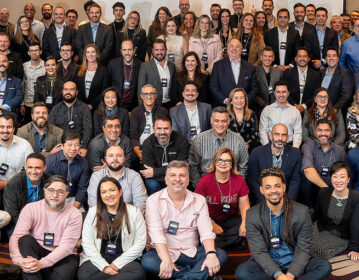Swedish rail logistics company cites strategic partnership, ultra-responsive support and peace of mind as key reasons to extend support agreement
LAS VEGAS, September 22, 2020 – Rimini Street, Inc. (Nasdaq: RMNI), a global provider of enterprise software products and services, the leading third-party support provider for Oracle and SAP software products and a Salesforce partner, today announced that Green Cargo, the Swedish state-owned rail logistics operator, has renewed and extended support and maintenance for its mission-critical SAP ECC 6.0 platform Rimini Street. Green Cargo first switched to Rimini Street Support in 2017 and is continuing with the Company’s ultra-responsive high-quality support model to enable the organization to continue to focus on its transformation initiatives – including the adoption of an agile, low-code application strategy – confident in the knowledge that its core SAP applications will remain stable and reliable under Rimini Street Support.
Rimini Street Support Gives Green Cargo Confidence to Transform IT Infrastructure
Green Cargo is a government-owned organization transporting 22 million tons of freight every year and serving close to 300 locations in Sweden, Norway, and Denmark through its network, as well as linking to nearly 2,000 destinations in continental Europe. In 2019, a new leadership team took over at Green Cargo with the objective of returning the business to profitability and supported Sweden’s Environmental Sustainability Goals. A new chief information officer (CIO) was given the task of developing an IT strategy that would build a foundation for modernizing the organization while mitigating major IT risks. The company set strategic objectives that by 2030, Green Cargo will increase the internal digitization of processes, automate its rail operations, and lead the integration of eco-friendly systems. Ultimately, the goal is to find new ways to accelerate technology, data, and innovation leadership to maintain its environmentally friendly competitive advantage and build a modern, open, and scalable platform architecture for the business.
Following the financial crash in 2008, Green Cargo had to take extensive cost-cutting measures and outsource its entire IT operation. By the end of 2019, it was clear this was having a significant impact on IT investment and was no longer sustainable as all of the IT systems that could be rationalized had been cut back as much as was feasible. The organization was left with two core systems, its mainframe and SAP environments, which were highly complex due to customizations that had been built up over time under different iterations of the IT strategy. The first strategic decision was to decide whether to migrate away from its core SAP environment and invest in a multi-year IT program to replace the existing system or find a new approach to meet the strategic needs of the business.
Low-Code Platforms More Quickly Drive Innovation
At the end of 2019, Green Cargo decided to remain with its existing core mainframe and SAP environments. Its SAP systems would continue to be supported by Rimini Street’s third-party support to give the company confidence its core business applications remained stable while it adopted a more evolutionary approach to innovation. IT sought to evolve the core infrastructure and instigate an evolutionary path to minimize disruption using a low-code approach to the design, testing, and development of new applications, which would integrate with the core infrastructure and operate in a hybrid, multi-cloud environment.
Rimini Street has now become one of five trusted strategic partners to Green Cargo as it looks to implement its agile, low-code IT model. Green Cargo felt Rimini Street could be depended on to help secure, stabilize, and improve its critical SAP platform for many years to come. In addition, as with all Rimini Street clients, Green Cargo can continue to run its current SAP system for a minimum of 15 years from the time that they switched to the Company. Rimini Street has helped Green Cargo reduce a massive backlog of business development and compliance activities that had built up when there was little investment in IT. It has been able to stabilize the core SAP system, which includes FI/CO, HR, payroll, supply chain management, business warehouse, customer relationship management, and process orchestration. One significant challenge has been data duplication across different systems due to highly fragmented business processes.
“Our ambition is to deliver an IT roadmap that is driven by business needs, avoiding huge investments and the risks of migrating to other platforms including the disruption to our business and the risk that the IT systems supporting our train network would go down,” said Ingo Paas, CIO, Green Cargo. “Knowing that we have Rimini Street as a trusted strategic partner, ensuring the stability of our core SAP system, means we have the confidence and capacity to focus on the execution and further development of our business goals. Rimini Street is solely focused on support and is incredibly customer-centric, which means it is constantly aiming to raise the bar and find new ways to deliver high-quality, cost-effective support to our business.”
Long-term, the IT team plans to change the endpoint for its services through greater integration with its customers’ business processes to increase transparency and demonstrate how its rail services are part of its customers’ core production processes. In the future, it expects to fully automate relationships with its customers using innovative products seamlessly integrated into their supply chains. The organization will continue to work with Rimini Street moving forward to find ways to improve its SAP platform. Together the companies have identified 24 specific initiatives to help improve the performance of their SAP system, such as modernizing NCC’s user interface so the application can be accessed on mobile devices.
As with all Rimini Street clients, Green Cargo benefits from the Company’s flexible, premium-level enterprise software support model, including its industry-leading Service Level Agreement (SLA) of 10-minute response times for all critical Priority 1 cases. Clients are also assigned a Primary Support Engineer (PSE), backed by a team of functional and technical experts, who have an average of 15 years’ experience in the client’s software system.
“The strategic review Green Cargo has undertaken reflects the IT challenges facing many of our European customers today, and underlines that third-party support plays a strategic role for organizations transforming their approach to application development and deployment,” said Mark Armstrong, general manager, Europe, Middle East, and Africa, Rimini Street. “By removing the burden of managing its core SAP applications, Green Cargo can concentrate on building out its agile low-code strategy, which will help ensure the organization remains competitive into the future. Rimini Street provides far more than the 50% savings on a client’s annual support fees – we can play a strategic role in our clients’ long-term IT strategies, which will see them save up to 90% on total-cost-of-support. Also more importantly, we give our clients the peace of mind to concentrate on how IT will deliver value to the business.”


